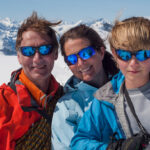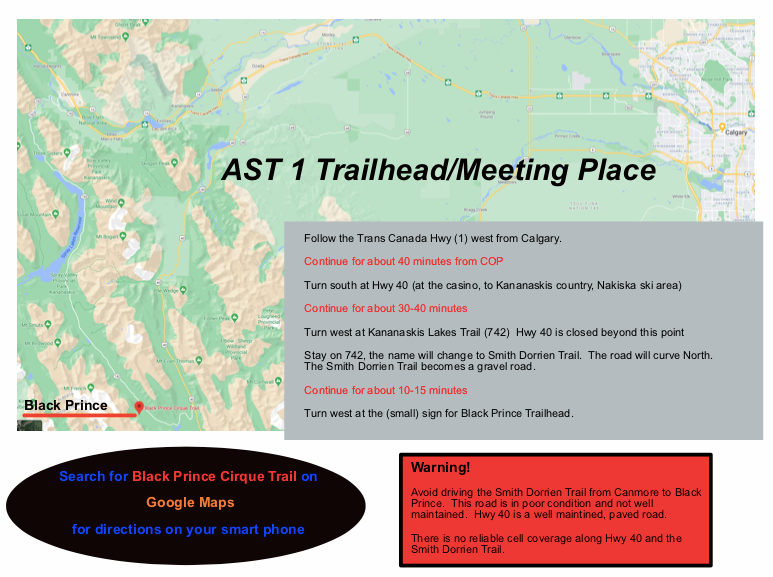- About the ACC
- Membership
- Huts
- Adventures
POLICIES & INSURANCE
- COMMUNITY
- Environment
- Shop
- Give
Are you looking to fill gaps in your winter? Backcountry skiing is a great way to do so. If you have previous experience and have previously taken an AST 1 course then we highly recommend taking AST 2.
Taking an AST 2 course is an essential ingredient for the intermediate backcountry skier or splitboarder who wants to start exploring more complex avalanche terrain safely and independently. Unlike an AST 1, participants can expect to be fully involved in the day-to-day selection of routes and objectives on this course, with the support and feedback of your guides. You’ll also be introduced to more advanced stability tests and snowpack analysis.
At ACC Adventures, we cover the standardized curriculum (as outlined by Avalanche Canada) but with an ACMG ski guide as well as a CAA professional license holder on staff, we’ve gone much further to create a customized program that caters specifically to skiers and splitboarders.
This is our standard course that happens over 3 to 4 days. We have adapted the classroom day(s) to an online offering to keep our program COVID friendly. Our field days vary depending on weather and snow conditions but we try to vary them as much as possible to show you different snow packs, terrain, and conditions. Common options are Kananaskis, Lake Louise and several options along the 93 north highway.
BOOKING INFORMATION
Field Days:
Click register now to see details for classroom sessions
DECEMBER 13-16 2024(In person classroom)
JANUARY 10-12 2025
Price: $795+ TAX

MORE INFORMATION
Please try to register online before calling. If you are having issues please try to have your emergency contact information and course questionnaire filled out before calling.
OR Call: (403)-678-3200 ext 213
Backcountry Skiing Hazards
What are the risks
Hazard Mitigation
Hazard Mitigation
Hazard Mitigation
Hazard Mitigation
Expanding on the skills that you learned in AST 1 the AST 2 course is designed to teach you to explore more complex terrain. Field days will have a heavy focus on getting students in the lead and making decisions on the move. Teaching you how to lead and route plan for your own trips. Your guides will introduce a variety of new snow stability tests, as well as a more advanced set of snowpack analysis skills and their application, not previously introduced in the AST 1 course.
All our students receive a certificate upon successful completion of the course. The AST 1 is a prerequisite certification course you are expected to have before attending AST 2
Full day classroom and online sessions will cover the entire curriculum listed below. The classroom session will take place at the Canmore Club House. Full day sessions (classroom, online) will start at 9:00 am. The two evening sessions will meet online at 6:00 pm MST via a zoom link sent out 1-2 weeks before course starts. These evening sessions will end around 9:00 pm MST. Curriculum topics covered evening one include:
The locations for the field days will be discussed with the class participants and could be anticipated to start at the location at 9:00 am MST. On these days you will be making real-life observations and gaining hands-on experience. Curriculum topics which will be covered on these days include:
Our field day will see a maximum participant-to-guide ratio of 6:1 to make for the best possible learning experience!
To receive the AST 2 Certificate, participants must first take the AST 1 Program. This program is open to all ACC members who are at least an intermediate or type II skier and have an interest in learning about avalanche phenomena in more challenging and complex mountain terrain. Participants can expect longer and more physical days than on the AST 1 Course.
To keep the cost of this camp as low as possible for you, food is not provided on this camp. Be sure to bring along a packed lunch and your favourite snack to fuel the field day!
Accommodation is not included in this course.
We have a dedicated team of instructors (below) who are excited to provide you with knowledge to start of your backcountry experiences safely. We want to provide the best possible learning experience and give you maximum opportunity to ask questions. So for our field days, we bring in an extra guide/instructor where necessary to keep participant-to-guide ratios below a maximum of 6:1.
The ACC hires guides certified by the Association of Canadian Mountain Guides (ACMG). Visit the ACMG website to learn more about what they do!

If you don’t have everything on the gear list and aren’t ready to invest in your own, there are many awesome local businesses that rent out all of the equipment you will need. Be sure to reserve your rentals ahead of time to make sure everything you need is available for you when you need it.
DOUG LATIMER
Doug has 20+ years of guiding experience behind him as an ACMG ski guide and an ACMG apprentice rock guide. As well as his private guiding he has spent a number of years working for the UoC where he taught a range of instructional programs in avalanche training, crevasse rescue and backcountry ski and ski mountaineering. He also somehow finds time to run a multimedia production company! On top of all that, we are lucky to have Doug as our lead winter guide, where he shares his fantastic enthusiasm and extensive knowledge throughout our winter programs.


We sell Tugo® Travel Insurance suitable for both ACC Adventures and personal trips:
INCLUDED WITH YOUR CAMP FEE
PARTICIPANTS MUST PROVIDE
ORGANIZING FANTASTIC ACC ADVENTURES FOR OVER 100 YEARS
Input your search keywords and press Enter.